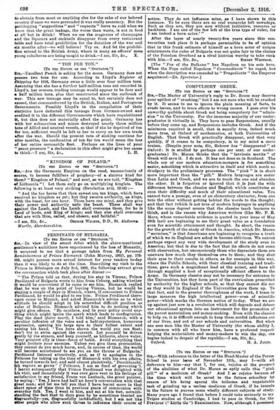COMPULSORY GREEK.
[To VIZ EDITOR OP TIII " SPECTATOR.")
Sri,—The Master of University's reply to Dr. Rouse may deserve your epithet of " crushing," but I am not sure who will be crushed by it. It seems to me to ignore the plain meaning of facts, to evade issues, and to trace effects to wrong causes. I pass over his unworthy quibble about Greek not being compulsory for " admis- sion " to the University. For the immense majority of our under- graduates it virtually is. They have to pass Responsions, usually before they come up, and Responsions includes Greek. And if the minimum required is small, that is equally true, indeed much more true, at Oxford of mathematics, at both Universities of English. That Greek will practically disappear, and that very quickly, if it ceases to be compulsory, is to my mind a mere
truism. (Despite your note, Sir, Hebrew has " disappeared" at Oxford: it is studied by perhaps one per cent. of our under-
graduates.) Dr. Magian thinks that the " intrinsic merits " of Greek will save it. I do not. It has not done so in Scotland. The whole cry of our modern education-mongers is for something easier, something which is attractive in itself and which needs no drudgery in the preliminary processes. The " pink " is in short more important than the " pill." Modern languages are easier than Latin and Greek, and we are to teach the one and abandon the other. It is forgotten or ignored that it is just the wide difference between the classics and English which constitutes at once their difficulty and much of their educational value. You cannot turn a passage, even of an elementary character, from one into the other without getting behind the words to the thought; and that fact (which is not true of modern languages in anything like the same degree) means that the classics teach learners to think, and is the reason why American writers (like Mr. P. E.
More, whose remarkable evidence is quoted in your issue of May 20th last) are beginning to see their great value as a foundation even for scientific attainment and thought. In short, the reason for the growth of the study of Greek in America, which Dr. Macan " surmises," is that Americans are beginning to recognize a truth of which wo in England are asked to become oblivious. We cannot
perhaps expect any very wide development of the study even in
America; but that is due to the fact that its effects do not come with observation, but unconsciously those who depreciate them are unaware how much they themselves owe to them; and they shut their eyes to their results in others, as for example in this war, where the Public Schools, with their classical training and tradi- tions, gave such a magnificent lead at the outset, and have all through supplied a host of exceptionally efficient officers to the Army. In Germany classics may not be necessary for entrance to the Universities, but they form part of the curriculum prescribed by authority for the higher schools, so that they cannot die out as they would in England if the Universities gave them up. To that fact, and to the greater thoroughness of the work, I trace in
large measure the high intellectual power—even of scientific power—which marks the German nation of to-day. What we are
up against just now is a revolution which will degrade and debase our educational system into an instrument for the promotion of the purest materialism and money-making. Even with the classics to help us, it is difficult enough to keep these sordid influences out of our lives, and out of our schools and universities. But when one sees men like the Master of University (for whose ability I, in common with all who know him, have a profound respect) helping the materialists and money-makers to win the day, one begins indeed to despair of the republic.—I am, Sir, Sic.,












































 Previous page
Previous page